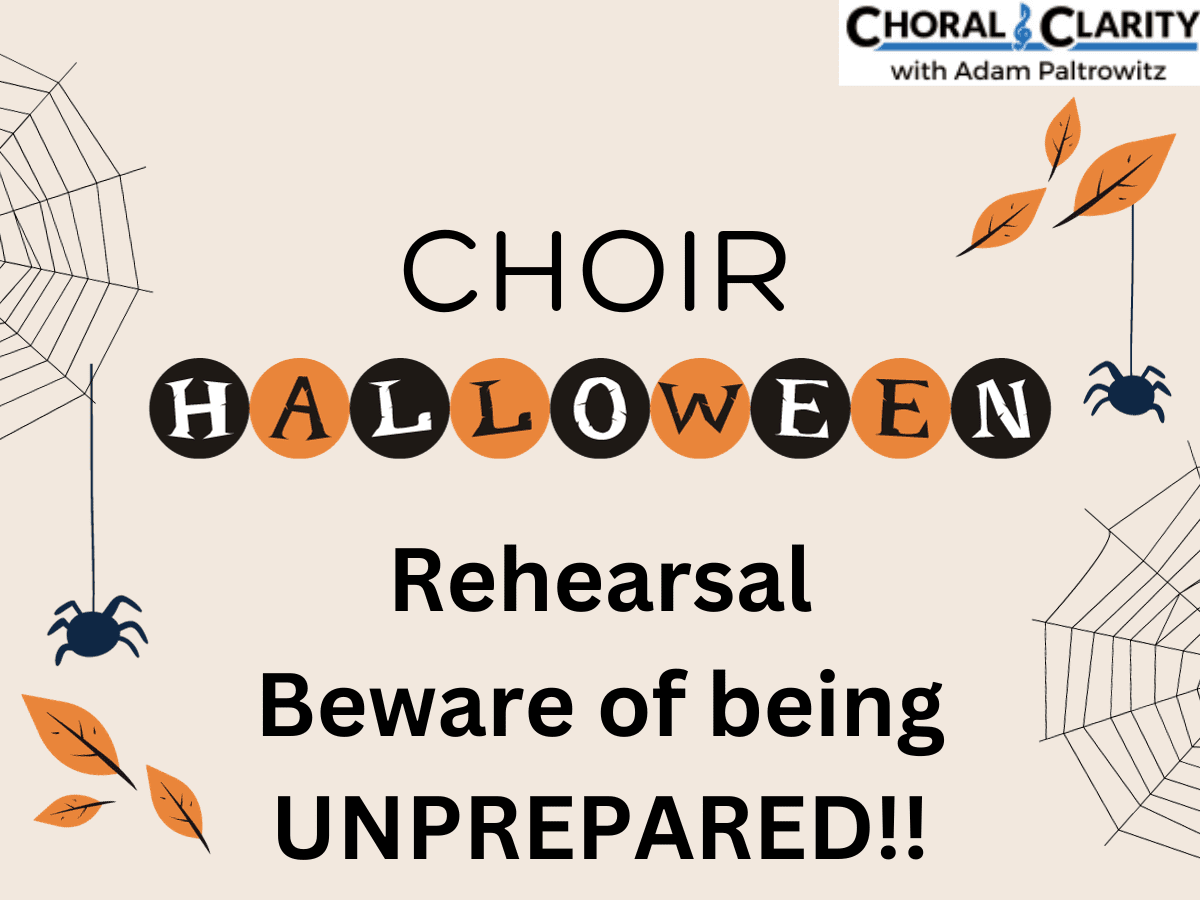In more than two decades of teaching at the same high school, I’ve had less than a dozen African American students. Of that small handful of students, a high percentage became top leaders in my choir. Until recently I had believed that a positive environment and intentional classroom culture would create social equality for all students. And, until recently I thought I had done a great job at creating the ideal environment for all students.
Well, I’m here to admit that I was dead wrong.
The last year, in particular, has brought out so many truths and made me realize so much about myself and about systemic racism. I realized that the reason why I thought I had been doing a great job is because I’d been viewing this success through my own, privileged lens.
After participating in many eye-opening Facebook threads, in-person discussions, and a great deal of self-reflection, I have realized that I can do a much better job when it comes to black students and educating all students about privilege, opportunity, oppression, and Black choral history as a whole.
As a result of my own personal journey, one that is just beginning, I would like to share 6 realizations in hopes of helping those who are on a similar journey.
Here are 6 Realizations from this White Director about Inherent Racism within my choir:
Realization #1 – I will never know what it feels like to be the only black student in my choir
Note: This is not comparable to being the only white student in a black choir. This is not comparable to being the only Jew in a Christian choir. I will never know what it feels like. By creating a “homogeneous” feel within my choir, I am potentially creating a choral culture that is void of the uniqueness of the few students who are Black. I must remember these students don’t “happen” to be black as that assumes that being black is “accepted” rather than embraced. No intentional racist words need to be uttered and still racism can occur within my choir. Our very own choice of words, choice of songs, style of teaching, required habits, and set expectations could permit a student to feel discriminated against. I must recognize that I do not know what it feels like to be black and be a member of my choir.
Realization #2 – Ignoring “race” is NOT acceptable
“I don’t see color” may feels like a safe comment for a choir director to make but it is not safe for students of color, as we are denying them of their uniqueness, their history, and rich culture. If they are the only ones who appear different and we don’t see this, we truly aren’t seeing them, nor are we recognizing the truth of how others are seeing them.
Realization #3 – Embracing differences is the only way to create a melting pot
I’ve heard comments from older colleagues who talk about the olden days when people didn’t discuss their heritage. They were Italian, Hispanic, Irish, Black, etc, and everyone got along. The reality is that being Black is not the same as being Italian, Hispanic, or Irish. And just because it appears everyone feels accepted doesn’t mean they do feel accepted. We never know how much “conforming” someone has to do to fit into someone else’s world.
We must see color and embrace the beauty that makes each student unique. A true melting pot happens when we melt together the cultures, personalities, and perspectives of all students, as opposed to creating rigid expectations of a homogenized culture where everyone is expected to conform; a brief reminder that this homogenized culture is likely based in systemic racism, as this is the only world we’ve known.
Realization #4 – Singing songs from cultures around the world (including our own) does not prevent racism
It is truly important to sing music from many cultures from around the world. It is equally important that we sing spirituals and gospel music of our American culture. That in itself doesn’t do anything to stop racism. Students can groove and bop to a spiritual and that has no bearing on what they think of their black peers or of the history of African Americans. I have read countless threads of former high school and collegiate students who have communicated that their “loving and nurturing” choral environment had failed them. I had one student call me out directly for my complicity and/or lack of awareness of what was truly going on. At this point in time, all I can do is apologize, self-reflect, and do better. The historically significant music of African American culture and/or contemporary works of African American composers can be a gateway for deep discussions regarding systemic racism, inclusion, privilege, etc., but the mere idea of singing a gospel song has absolutely no bearing on creating social justice or equality. We also typically program these pieces at the end of a program as a “fun closer,” which, for many, is equally offensive.
Realization #5 – It’s okay to make a mistake when it comes to race in the classroom
We must treat our students with grace and ask for grace in everything we do. We may say the wrong thing and mishandle a situation; how can we not, when we live in a world that has not taught us right from wrong when it comes to race issues? Many of us have grown up accepting false truths. Many of us have to undo the way we were taught.
We are going to screw up. We are going to say the wrong thing, to mishandle a situation, to shut someone down without realizing it. Making mistakes and owning them is better than pretending race doesn’t exist and intentionally forcing all students to conform.
Realization #6 – We must have an open channel of communication with our students regarding race
If we want to make the choir world a better place, we must start by allowing our students to communicate openly. They may feel discriminated against by something we say, by an action that was taken in our classroom, by the way other students treated them, by the music we chose, etc. We should WANT to understand each students’ feelings. We should want to know how we could have handled a situation differently. We should want our students to feel comfortable enough to help us be better educators and better people moving forward.
Choral Black History Month
While I believe we should always be searching for inspirational black composers and sharing their voice, February is a celebration of Black history.
This is a perfect time to focus our attention on the inspirational black composers who have shared and currently are sharing their voice in the choral world. This month, I have been specifically inspired by two African-American choral educators in our virtual world who have been sharing tremendously valuable content regarding Black History Month.
- For the month of February, Dr. Jeffrey Allen Murdock has posted a daily list of the most inspirational Black choral conductors in our country. Every day I learn of least one amazing black choral conductor. The depth of the bios that Dr. Murdock provides of each conductor is nothing short of amazing. I especially love his focus on black, female conductors across this country. While currently, one needs to be in one of the large Choral Facebook Groups or on his Public Facebook page, to see his daily posts, he shared that he is planning on compiling the entire list and making it available to everyone. At that point in time, with permission, I will have that link available for my subscribers. In addition, Dr. Murdock has a phenomenal post that lists MANY prominent black choral composers and gospel pedagogues. Please check his public post out!
- Maria A. Ellis is an awesome choral educator with a phenomenal website that everyone should visit. From there, you must check out her tremendously active Instagram and podcast and participate in the meaningful discussions that she leads on Clubhouse. On all of these platforms she embraces the beauty of race in the choral world. I first discovered her through her amazing teaching videos and quickly realized those wonderful musical moments captured on film are just the bi-product of a human being who is making a huge difference as an influential black music educator and thought leader in our field.
I dare you to watch this video for the entire 7 minutes and NOT be inspired. DO NOT STOP BEFORE THE END!
Final Words
As a white conductor of privilege, I was nervous about putting out any blog post specifically on the topic of Black History month. There was a part of me that thought I didn’t have the right to: it’s not my history. But then I realized as a self-proclaimed thought leader in choral education, it is my moral obligation to share my own journey into understanding race.
I believe it’s important that choir directors of all races are recognizing and celebrating Black History Month, especially if we are not Black and nervous about “doing it right.” I recognize that how and what I teach my students this year will be way less effective than what I’m going to teach them in five years from now. I’m taking one step at a time, realizing that it is my responsibility to be part of the change moving forward.
Happy Black History Month!
Try SIGHT READING FACTORY and save 10% using code: choralclarity







Leave A Comment